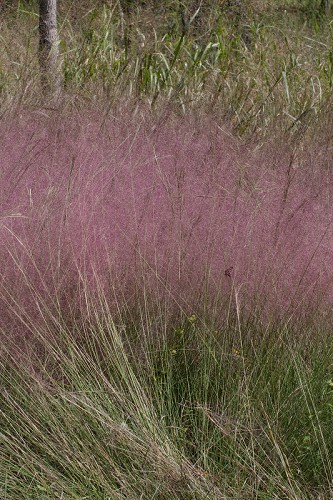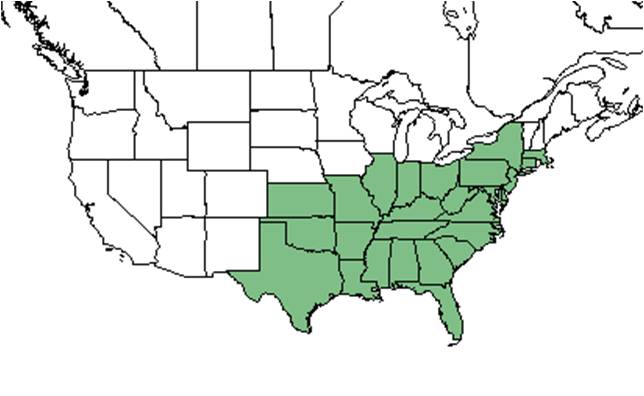Difference between revisions of "Muhlenbergia capillaris"
(→Seed dispersal) |
|||
| Line 31: | Line 31: | ||
<!--===Habitat===--> <!--Natural communities, human disturbed habitats, topography, hydrology, soils, light, fire regime requirements for removal of competition, etc.--> | <!--===Habitat===--> <!--Natural communities, human disturbed habitats, topography, hydrology, soils, light, fire regime requirements for removal of competition, etc.--> | ||
===Phenology=== <!--Timing off flowering, fruiting, seed dispersal, and environmental triggers. Cite PanFlora website if appropriate: http://www.gilnelson.com/PanFlora/ --> | ===Phenology=== <!--Timing off flowering, fruiting, seed dispersal, and environmental triggers. Cite PanFlora website if appropriate: http://www.gilnelson.com/PanFlora/ --> | ||
| − | + | ''M. capillaris'' has been observed flowering in September and October.<ref>Nelson, G. [http://www.gilnelson.com/ PanFlora]: Plant data for the eastern United States with emphasis on the Southeastern Coastal Plains, Florida, and the Florida Panhandle. www.gilnelson.com/PanFlora/ Accessed: 12 DEC 2016</ref> | |
| + | |||
===Seed dispersal=== | ===Seed dispersal=== | ||
This species is thought to be dispersed by gravity. <ref>Kirkman, L. Katherine. Unpublished database of seed dispersal mode of plants found in Coastal Plain longleaf pine-grasslands of the Jones Ecological Research Center, Georgia.</ref> | This species is thought to be dispersed by gravity. <ref>Kirkman, L. Katherine. Unpublished database of seed dispersal mode of plants found in Coastal Plain longleaf pine-grasslands of the Jones Ecological Research Center, Georgia.</ref> | ||
Revision as of 15:11, 6 November 2018
| Muhlenbergia capillaris | |
|---|---|

| |
| Photo by John R. Gwaltney, Southeastern Flora.com | |
| Scientific classification | |
| Kingdom: | Plantae |
| Division: | Tracheophyta- Vascular plants |
| Class: | Lilianeae -Monocotyledons |
| Order: | Poales |
| Family: | Poaceae |
| Genus: | Muhlenbergia |
| Species: | M. capillaris |
| Binomial name | |
| Muhlenbergia capillaris (Lam.) Trin. | |

| |
| Natural range of Muhlenbergia capillaris from USDA NRCS Plants Database. | |
Common names: Hairawn muhly
Contents
Taxonomic notes
Synonym: Muhlenbergia capillaris (Lam.) Trin. var. capillaris
Description
"Perennials. Blades usually scaberulous on both surfaces and margins; sheath margins scarious, at least apically; ligules scarious, erose or erose-ciliate. Spikelets 1-flowered. Glumes equaling or shorter than lemmas, lemmas not indurate. Grain enclosed by lemma and palea at maturity." [1]
"Cespitose perennial; culms 5-12 dm tall, nodes and internodes glabrous. Leaves primarily basal; blades flat or involute, to 3 dm long, 103 mm wide; sheaths scaberulous; ligules 2-5 mm long. Panicle open, diffuse, delicate, 2-5 dm long, 1-2 dm broad; branches capillary, spreading, scaberulous. Spikelets usually purplish, lanceolate to narrowly ellipsoid, 4-5 mm long excluding awn; pedicels capillary, spreading, scaberulous. Glumes usually 1-nerved, usually scaberulous on midrib, scarious, 1st glume body 0.3-1.2 mm long, awn 0.3-1.2 mm long, 2nd glume body 1-1.5 mm long, awn 1-1.5 mm long; lemmas purplish, 3-nerved, scaberulous, body 3-4 mm long, awns 3-12 mm long; paleas purplish, faintly nerved, acuminate, 3-4 mm long. Grain purplish, narrowly ellipsoid, 2-2.4 mm long." [1]
Distribution
Ecology
Phenology
M. capillaris has been observed flowering in September and October.[2]
Seed dispersal
This species is thought to be dispersed by gravity. [3]
Conservation and management
Cultivation and restoration
Photo Gallery
References and notes
- ↑ 1.0 1.1 Radford, Albert E., Harry E. Ahles, and C. Ritchie Bell. Manual of the Vascular Flora of the Carolinas. 1964, 1968. The University of North Carolina Press. 107. Print.
- ↑ Nelson, G. PanFlora: Plant data for the eastern United States with emphasis on the Southeastern Coastal Plains, Florida, and the Florida Panhandle. www.gilnelson.com/PanFlora/ Accessed: 12 DEC 2016
- ↑ Kirkman, L. Katherine. Unpublished database of seed dispersal mode of plants found in Coastal Plain longleaf pine-grasslands of the Jones Ecological Research Center, Georgia.